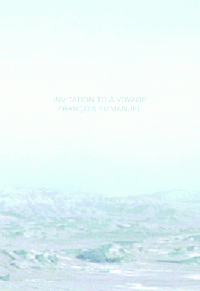 Invitation to a Voyage
Invitation to a Voyage
by François Emmanuel
Translated by Justin Vicari
Dalkey Archive Press, 2012
112 pages / $12.95 Buy from Dalkey Archive, Amazon
Sometimes, writing is so baldly pretentious and pointedly wackadoo that readers assume, without really feeling much of anything, that it must be ‘experimental’ or ‘poetic.’ This implies that the author—that brave, eccentric fellow!—is ‘more alive’ than the rest of us, more attuned to some numinous kernel of ecstasy and desire. The rest of us, meanwhile, are consigned to wallow in the general generic muck.
Such is the wager of François Emmanuel’s Invitation to a Voyage, a short collection just out from the wonderful folks at Dalkey Archive: that the reader, confronted with the interior monologs, the surrealist quirks and all the other one-time experiments of modern lit, will fault themselves for not quite ‘getting it.’
READ MORE >
Comments Off on Invitation to a Voyage
January 16th, 2012 / 12:00 pm
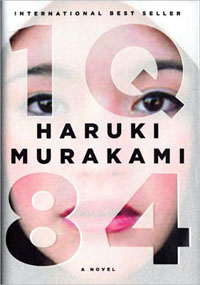 IQ84
IQ84
by Haruki Murakami
Knopf, 2011.
944 pages / $30.50 Buy from Amazon
One
Please do not read this or any other review if you intend to read IQ84. A Murakami novel is best read without knowledge of its plot.
Few books are about life itself.
Part of the reason we live is to see what happens next. Will we go to college? Go on a road trip? Whom will we marry? When? Will we have children? Will we move? Will we get that job? Meet eyes with a girl who reminds us of someone we once knew? What will we have for dinner?
IQ84 is alive with its own life. Start from the beginning and see what happens next. The less you know, the more fun the discovery will be. All you need to know is this:
The book takes place in Tokyo. There are two main characters, Tengo and Aomame. You must bring to this book your own preconceptions about everything—God, existence, love, morality—not mine or anyone else’s. Your reading will be your own.
Your wrists may hurt as you read—the novel is almost 1000 pages. It’s a heavy tome because it’s a whole universe. The pain in your wrists will be worth the wormhole.
Now get out of here.
READ MORE >
15 Comments
January 13th, 2012 / 12:00 pm
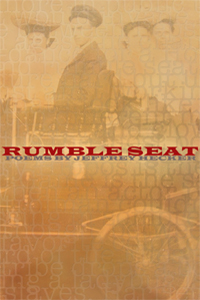 Rumble Seat
Rumble Seat
by Jeffrey Hecker
San Francisco Bay Press, 2011
78 pages / $14.99 Buy from Amazon or San Francisco Bay Press
“If I die during a crossword puzzle, I am allowed to finish.” So nearly concludes Rumble Seat, a Cretan-cum-Cracker Jack maze of delights presided over by the shade (elms over David Lynchian suburbia, not ghost) of Frank O’Hara. What happens when boy-next-door niceness merges with a rapier wit? You can’t ask David Foster Wallace anymore, but Jeffrey Hecker’s debut volume is a thoroughly selcouth exploration into the question. It’s a world where down-to-the-last-dime travelers can choose between “Basilica donation or acetaminophen, but largesse and simony lose by a Samson pubic strand”; where toothless soothsayers skulk around local churches, warning children that “dying during worship causes souls to suck through aperture.” We may be any number of places with Hecker: at a beef recall (as opposed to a southern-style pig pickin); with a transmogrified Sally Field with her “hair departed in buffalo tufts/intentions and glands in the wrong places/pituitaries topped off by kidneys”, bloodshot eyes leading the children of lost Roanoke colonists astray…but mostly at home, where strangeness, like charity, begins.
READ MORE >
Comments Off on Mistletoe and Misanthropy Out On a Limb: Jeffrey Hecker’s Rumble Seat
January 9th, 2012 / 12:00 pm
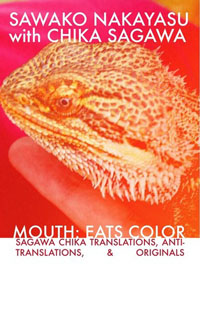 Mouth: Eats Color
Mouth: Eats Color
Sagawa Chika Translations, Anti-Translations, & Originals
by Sawako Nakayasu with Chika Sagawa
Factorial Press, 2011
90 pages / $14 Buy from Amazon
Sawako Nakayasu’s Mouth: Eats Color is enthusiastic. It’s enthusiastic about the plural nature of meaning, about disavowing loyalty to any single language, about the act of translation as a kind of breakage. Her own poetry which often has the quality of being exuberant but measured, folds into this new book of translations as if she is having a conversation with not only Chika Sagawa but the work itself as a separately conscious entity. Or perhaps more accurately the book is in the act of collapsing several conversations, continually re-engaging the same subject on various planes.
The collection tests the flexibility of language and Sawako Nakayasu isn’t particularly gentle about it. But being gentle is for writing tributes and Mouth: Eats Color is more of an elongation, a circular extension of the text. And while she’s very polite, there’s muscle behind the way she translates, assembles, dissembles, resembles. “Promenade,” a poem repeatedly translated in Mouth: Eats Color changes its first line from “Seasons change their gloves” to “Season bag” to “Seasonal gloves” to “Seasons change their gloves,” every variation slipping easily into the next until they stop reading like re-translations of the same poem so much as chorus. The flow between her poems and Chika Sagawa’s poems offers up questions of where translation ends and collaboration begins, or if the act of translation is even possible—posits that even if content were able to sync perfectly between two completely different languages it might not survive the desire to insert authorial perspective. The collection asks that the reader consider the point when a translation deviates from the original just enough to become an entirely new work and offers up no answers except to say that the authenticity of a poem never mattered in the first place.
READ MORE >
5 Comments
January 6th, 2012 / 1:00 am
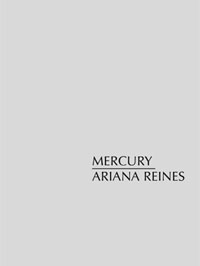 Mercury
Mercury
by Ariana Reines
Fence Books, 2011
128 pages / $16.95 Buy From Fence
Three falls ago, I was in one of my first legit poetry workshops (that particular workshop during which I realized that poetry was going to be one of those things that would be part of my life for forever, like Lyme Disease or an eating disorder) and I was freaking out about being a girl and wanting to write a particular kind of poem and feeling that I wasn’t allowed to do so. My professor, who was/is this very wise man, a carpenter as well as a poet and probably a prophet of some kind, told me I might be interested in reading Ariana Reines. Since I was at the time a very eager and diligent student I went to my room and read every one of her poems I could find online, and as it was right before Christmas I sent my mom the following e-mail that night:
re: christmas list
Carina Finn
11/30/09
to Debra, debiallied
Also every book ever written by Ariana Reines instead of just the one. There aren’t that many and they aren’t the expensive because she’s only 26. In fact there are only two, Coeur de Lion and The Cow, three if you count her translation of My Heart Laid Bare by Baudelaire which I would also enjoy. Feel free to pass this along to anyone you know who’s in the market for a Christmas present for me. Those books are now the most important things on my list because they are the most important books that have been written in a very long time.
Because my mother has always bought me any book I have asked for without question, I did get these books for Christmas and I spent all of winter break that year reading them and re-reading them. Since then, because of a lot of happy cosmic circumstances, I’ve had the chance to read her work in graduate classes, write about it, see Ariana read it, and talk to her about it. What follows is a rendition of Facebook messages and e-mails between Ariana and me about her new book, Mercury, which was just released by Fence Books and can be purchased here.
READ MORE >
11 Comments
January 2nd, 2012 / 1:00 am
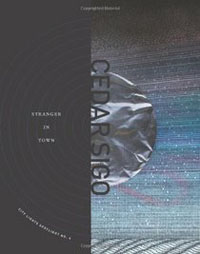 Stranger In Town
Stranger In Town
by Cedar Sigo
City Lights Books, 2010
100 pages / $13.95 Buy from City Lights
“One must keep holy the edges of fragments.” That line appears twice in Cedar Sigo’s second collection of poems, Stranger in Town, and brings to my mind the kabbalistic notion of the shattered vessels. In the beginning, according to Kabbalah, was a divine light so potent that it shattered the vessels in which it was contained, scattering sparks and shards throughout all of creation. Mankind was charged with the task of recovering the fragments and restoring the vessels.
READ MORE >
7 Comments
December 12th, 2011 / 12:00 pm
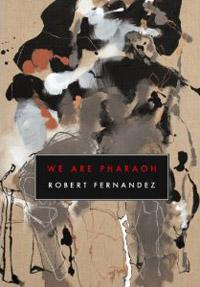 We Are Pharaoh
We Are Pharaoh
by Robert Fernandez
Canarium Books, 2011
136 pages / $14 Buy from SPD
We Are Pharaoh is Robert Fernandez’s first collection of poems, published in 2011 with Canarium Books. In this collection, we find ourselves located in a lush and tropical landscape; however, this landscape becomes quickly complicated by a fragmented lyric that ensnares all that crosses its path. While Fernandez’s poems are entangled in broad themes such as the lyric, human history, art, and the Sublime, the poems of this collection are primarily concerned with the cyclical and conflicted nature of upheaval. Although it seems impossible for one collection of poems to effectively reconcile so many disparate and limitless themes, Fernandez succeeds in creating a sense of cohesion. There is an inexplicable awe and certain joy that radiates from We Are Pharaoh as Fernandez tasks us with the challenge of tracing and teasing apart his root-like lyric—“A tangling of fruits and vases” where “the shade is verboten.” In this act of tracing, and “if [we] were to succeed,” we may discover what truths may lie “in blinding sunlight” above the foundation of this collection (84).
READ MORE >
11 Comments
December 5th, 2011 / 12:00 pm
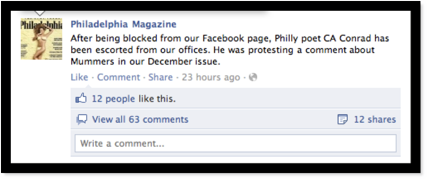
There’s a lot of talk currently surrounding a recent article in Philadelphia Magazine and the public confrontation between the publication and CA Conrad. In the magazine’s December “List” issue, the Philly mag devoted one list to things the city would be better off without, i.e. “10 Things We Need to Get Rid Of” (seemingly available in print only). Included on the chopping block was the city’s long-running tradition of the Mummers Parade. The Philadelphia poet disapproved, claiming that the Mummers was a street level, middle class event dear to the city, its history, and its people and that the magazine was exercising a characteristically elitist, classist, 1% attitude. He first voiced his complaints on the Philadelphia Magazine Facebook page requesting they apologize to Mummers. The magazine’s online editor eventually blocked him from commenting, which resulted in Conrad visiting the office to speak with the magazine personally and subsequently being removed by security. You can begin to follow the story with the editor’s PR-ish letter on CA Conrad’s comments and behavior, then move to CA Conrad’s account of the event and his being escorted out of the office building. I would also encourage you look at the comments made by the public on these articles and the action on the magazine’s Facebook page; the majority seems to be supporting Conrad. Some are especially outraged that editor Tom McGrath (as a Philly culture editor) didn’t even know who CA Conrad was, or that the magazine would Facebook-flaunt that Conrad had been removed from their offices.
Personally, upon just hearing this story, I admire Conrad’s determination to voice his opinion, objecting to and requesting dialogue about the magazine’s choices. His walk to the Philadelphia Magazine’s offices on behalf of a cultural tradition or group of people he values is a tangible, powerful act. I like the artist like this, refusing to be safely contained as the Philadelphia Magazine attempted to do in denying Conrad visibility on Facebook or in an office, instead requesting he write an e-mail (which basically doesn’t exist in the public realm). I think his choice solidifies the role of the artist or poet in his/her city. He expanded the immediacy and impact of his voice by committing the physicality to back it.
But this event also raises a lot of questions for me about the responsibility of an artist or individual to their community, about the visibility or method of communication being given, taken, or denied here, etc. I’d love some thoughts as this sinks in.
***
Katie Smither is an artist and writer living in Austin. She works at the Harry Ransom Center at the University of Texas and does a lot of things on the side, or strike that and reverse it.
Random / 39 Comments
December 3rd, 2011 / 12:00 pm

 Invitation to a Voyage
Invitation to a Voyage  IQ84
IQ84 Rumble Seat
Rumble Seat Mouth: Eats Color
Mouth: Eats Color Mercury
Mercury Stranger In Town
Stranger In Town
